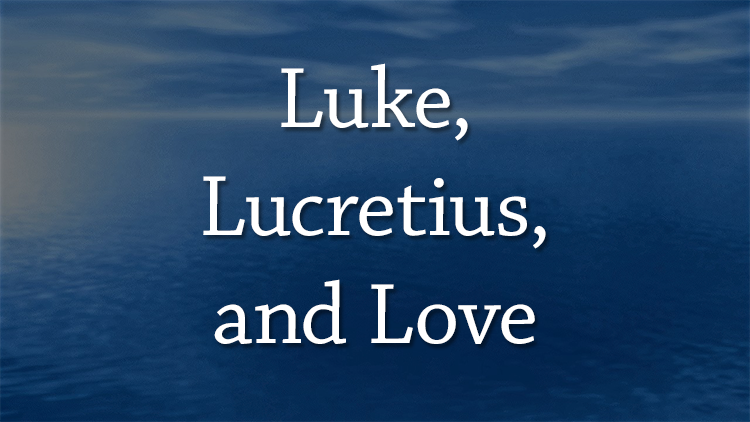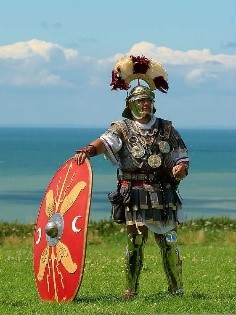
Luke, Lucretius, and Love
Luke, Lucretius, and Love -Acts 27
-Pastor Steve Schantz

Picture yourself as a deckhand on board a ship with Paul, a prisoner of the Roman government, A.D. 59. Paul and others are under the guarded care of Julius, a ten-year veteran and a centurion of the Roman Army. Your saga at sea, as told by Luke, begins with fair weather and elevated spirits. Julius even permits Paul to visit some of his Christian friends at a stopover in Sidon. Conditions quickly worsen after you board a grain trading vessel at Myra loaded down with wheat, metal goods, and pottery.
Time in the Tempest
Your Northwestern course faces harsh winds which force the pilot to tack repeatedly. But the progress is slow going, and he must loop south along the rugged coast of Crete where you come to port in Fairhaven. Paul, the prisoner, now offers advice from his own experience at sea:
Since much time had passed, and the voyage was now dangerous because even the Fast was already over, Paul advised them, saying, “Sirs, I perceive that the voyage will be with injury and much loss, not only of the cargo and the ship, but also of our lives.” But the centurion paid more attention to the pilot and to the owner of the ship than to what Paul said.
Acts 27:9-11
As the storm descends on you, the ship’s wooden structure creaks under the strain, and the tackle and gear are compromised. Gripped by fear, you begin loosening tackle and throw it overboard. Other hands help heave crates of cargo and stored grain over the stern, anything to lighten the load. Desperation grips passengers that are cold, hungry, and afraid. Your Epicurean worldview imagines a hopeless fate. You are on your own. But Paul speaks again, this time with the voice of a prophet.
Since they had been without food for a long time, Paul stood up among them and said, “Men, you should have listened to me and not have set sail from Crete and incurred this injury and loss. Yet now I urge you to take heart, for there will be no loss of life among you, but only of the ship. For this very night there stood before me an angel of the God to whom I belong and whom I worship, and he said, ‘Do not be afraid, Paul; you must stand before Caesar. And behold, God has granted you all those who sail with you.’ So take heart, men, for I have faith in God that it will be exactly as I have been told.
And then he added, But we must run aground on some island.”
Acts 27:21-26
Days become weeks. You lose track of day and night as the Northeaster rages. It’s rumored that the soldiers will kill all the prisoners rather than let him escape, and deckhands may not fare much better. It’s time to make your move. Pretending to drop anchor to steady the ship, you reach instead for the lines securing the life boat and prepare to jump, but Paul’s words foil your escape plan:
… “Unless these men stay in the ship, you cannot be saved.” Caught in the act, you “cut away the ropes of the ship’s boat and let it go.”
Acts 27:31-32
Paul then urges everyone to eat – as if there’s still a chance of survival! – and promises that not a hair on your head will perish. Under the canopy of wind and rain, he thanks his God for the bread he breaks with a loud voice:
And when he had said these things, he took bread, and giving thanks to God in the presence of all he broke it and began to eat. 36 Then they all were encouraged and ate some food themselves. (We were in all 276 persons in the ship.) And when they had eaten enough, they lightened the ship, throwing out the wheat into the sea.
Acts 27:35-38
With steering and anchoring now abandoned, you hoist the small fore sails and make a run for the shore at Melita. But the ships bow runs into jagged reef while heavy waves pound the stern, and the vessel begins to break up. Soldiers gather prisoners together to go down with the ship, but Julius calls out, “Stop! Paul must go on to Rome.” He bids all who can swim to do so, urging others to grab anything that floats. Exhausted and water logged, you drag yourself up on shore with the other 275 survivors. You’re alive! The story of this saga at sea and your delivery by Paul’s God is retold to family and friends, to tradesmen and soldiers. It’s even whispered by the prison guards in Rome.
The Rest of the Story
In the late 1300’s a Papal secretary named Poggio Bracciolini sifted through moldy manuscripts in a monastic library. He discovered an original work by Epicurean poet, Titus Lucretius Carus, (50’s A.D.). Because Poggio carefully copied it, we have Lucretius’ six-book Latin hexameter poem De rerum natura, (On the nature of things), to this day.
Lucretius’ held a prominent voice in Epicurean world view. Epicureans resist the idea that any gods or a God made the world or that they have any kind of control over the events of the universe – weather in included. Note how Lucretius’ description of a sea saga differs from the Apostle Paul’s: “When the supreme violence of a furious wind upon the sea sweeps over the waters the chief admiral of a fleet along with his mighty legions, does he not crave the gods’ peace with vows and in his panic seek with prayers the peace of the winds and favouring breezes. Nonetheless, he is caught up in the furious hurricane and driven upon the shoals of death.”
Though a contemporary of Paul, Lucretius saw people cringing in fear of what the gods may do. (Greek mythology certainly didn’t help, and Homer’s Odyssey was familiar to most 1st century authors.) In theological terms, Lucretius denied providence. Lucretius denied that a God or gods have a good intent for the world and act upon it. Of course, this meant it would be foolish, pointless even, to pray, especially in a storm! This also meant there is no such thing as a ‘miracle’. Observable change is simply the unfolding of nature. You can’t attribute the good fortune or bad fortune of your life or your sea voyage to any ulterior motive of a god. So Lucretius not only denies providence, he also denies prayer and miracles. This vail of darkness has set the stage for what Luke has to say and the way in which he says it in Acts chapter 27.

Lucretius is also attributed to laying the groundwork for what one day would become the periodic table of elements. In his book, The Swerve: How the World Became Modern, Harvard Professor Stephen Greenblatt suggests that Lucretius’ early theories of small movements of even smaller particles result in very large changes to our world, helped shape scientific and cultural thought from Galileo to Einstein. If professor Greenblatt is right, there is nothing new under the Sun… People still attribute the events of the world to the random collision of atomic particles and chance. Fallen human reasoning replaces one fear for another. We have run from capricious gods into the lap of capricious atoms and their sub-particles. (Actually, we’ve learned a bit more about how the atom works – enough to build bombs out of them.) But the fruit born of Lucretius’ lengthy poem still boldly peddles doubt of the divine to all who will listen. “Understand how this world works and face your meaningless life and death squarely in the face! Accept the fate of randomness knowing that this is just the way it is.” To replace a street language bumper sticker with a slightly tamer one – “Atom Happens!”
But Luke’s true testimony from Acts 27 reminds us all that a caring, capable, and personal God does intervene in the events of this world. He is with us even in the worst circumstances, the fiercest storms, and through our life threatening pandemics! He hears and answers our prayers according to His very good purpose in our lives.
In Acts 27, Paul does not call out to the gods, but to the one God! The Triune God who providentially cared for Paul and all who were aboard the vessel. And so they prayed… tossed about in the night…to see the light of day again. They prayed, not foolishly, not superstitiously…but thankfully to the God who provided bread to meet their hunger and the comfort of his promise to ease their fears.
Paul did reach Rome, after a few more stops and miracles along the way. In Romans chapter 8 he would write: “If God is for us, who can be against us… What shall separate us from the love of Christ?” This is the message that Luke brings to free us from a godless world. The God of Christ followers is not indifferent toward their lives. This God loves us!
Beloved in Christ: Christ is all-powerful to save, to deliver us from our sin and death, to intentionally love us and to bring us home safely through every storm.
